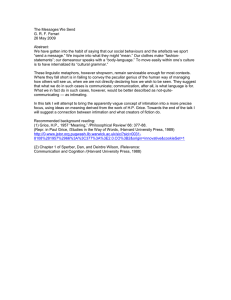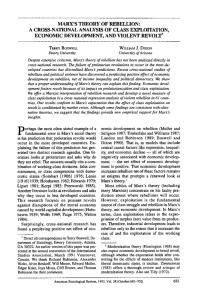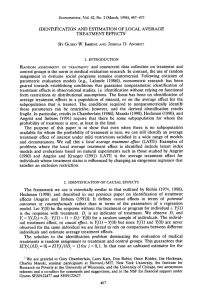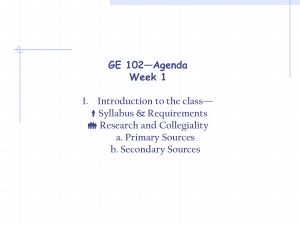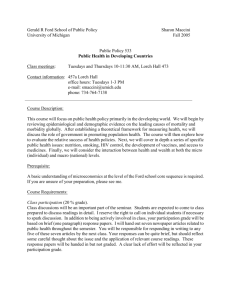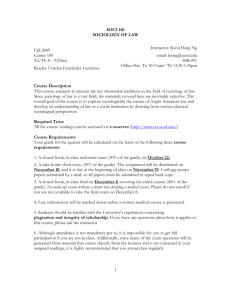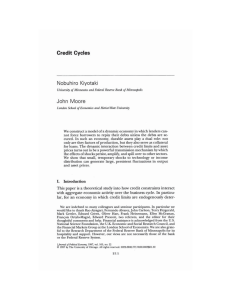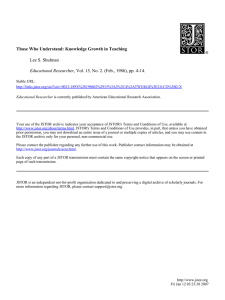First Paper Requirement
advertisement
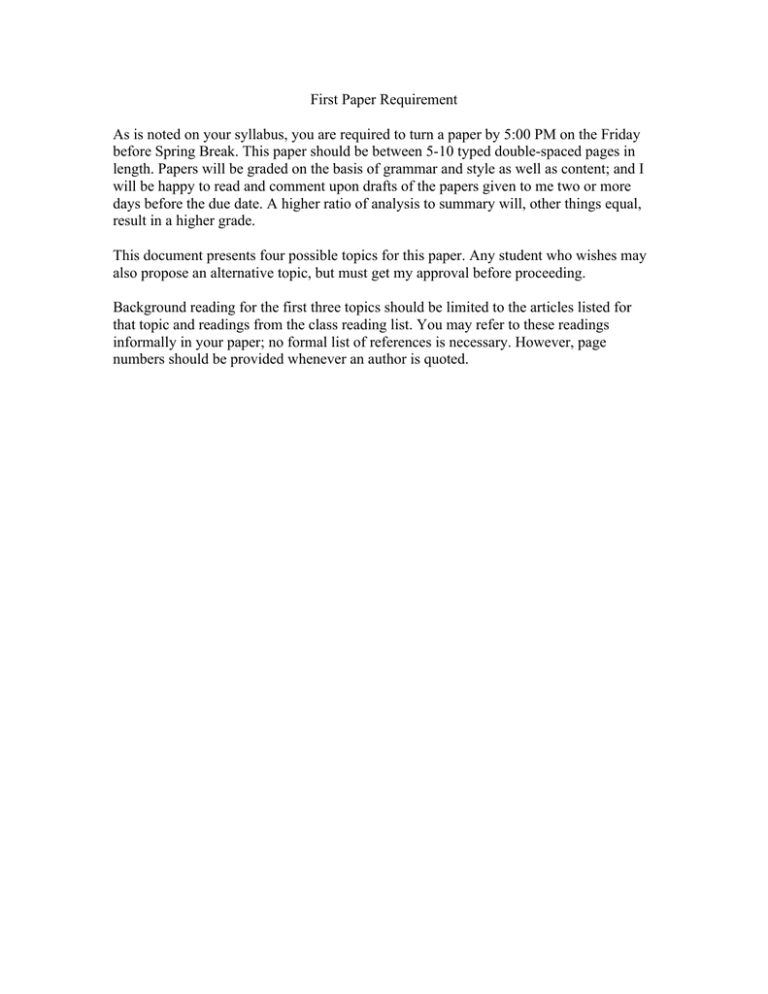
First Paper Requirement As is noted on your syllabus, you are required to turn a paper by 5:00 PM on the Friday before Spring Break. This paper should be between 5-10 typed double-spaced pages in length. Papers will be graded on the basis of grammar and style as well as content; and I will be happy to read and comment upon drafts of the papers given to me two or more days before the due date. A higher ratio of analysis to summary will, other things equal, result in a higher grade. This document presents four possible topics for this paper. Any student who wishes may also propose an alternative topic, but must get my approval before proceeding. Background reading for the first three topics should be limited to the articles listed for that topic and readings from the class reading list. You may refer to these readings informally in your paper; no formal list of references is necessary. However, page numbers should be provided whenever an author is quoted. Topic I – Debate over the Role of Quantitative Economics In 1924 Wesley Mitchell, a pioneer in the use of statistical data in economics, delivered his Presidential Address to the American Economic Association. In the address he presented a picture of how he thought the field of economics would be transformed by the increasing availability and use of economic statistics. Quantitative Analysis in Economic Theory Wesley C. Mitchell The American Economic Review, Vol. 15, No. 1 (Mar., 1925), pp. 1-12 http://links.jstor.org/sici?sici=00028282%28192503%2915%3A1%3C1%3AQAIET%3E2.0.CO%3B2-0 Certain passages in the address alarmed some economists, including Jacob Viner, whom you know as the Chicago economist who developed the “purified” form of Marshall’s partial equilibrium theory of competitive industries still found in modern principles of microeconomics texts. At a round-table discussion three years after Mitchell’s address, Viner criticized aspects of Mitchell’s address, and Mitchell responded. These two sets of comments can be found at: The Present Status and Future Prospects of Quantitative Economics Frederick C. Mills; Jacob H. Hollander; Jacob Viner; E. B. Wilson; Wesley C. Mitchell; F. W. Taussig; T. S. Adams; John D. Black; John Candler Cobb The American Economic Review, Vol. 18, No. 1, Supplement, Papers and Proceedings of the Fortieth Annual Meeting of the American Economic Association (Mar., 1928), pp. 28-45 http://links.jstor.org/sici?sici=00028282%28192803%2918%3A1%3C28%3ATPSAFP%3E2.0.CO%3B2-7 One option for dealing with this topic is to write a straight summary of the key arguments of the two men. The best possible grade for such a summary is an 85%. Another option is to read the address and comments, then state, develop, and defend a thesis concerning them. The thesis could involve attempting to explain what made the address controversial, how the two men compared as prophets of the future of economics, Viner’s accuracy and effectiveness as a critic of Mitchell and quantitative economics, etc. Defending a thesis involves, among other things, citing or referring to passages from the texts that support the point you are attempting to make. Topic II – The Empty Boxes The Sraffa article discussed in class was only one of many attacking or defending various aspects of Marshall’s value theory during the 1920’s. Another famous exchange began with the 1922 article “Of Empty Economic Boxes” by John Clapham, who at the time was England’s leading economic historian: Of Empty Economic Boxes J. H. Clapham The Economic Journal, Vol. 32, No. 127 (Sep., 1922), pp. 305-314 http://links.jstor.org/sici?sici=00130133%28192209%2932%3A127%3C305%3AOEEB%3E2.0.CO%3B2-J Responding to Clapham’s criticism of Marshall’s value theory was Arthur C. Pigou, Marshall’s hand picked successor at Cambridge University and one of the leading economic theorists of the early 20th century (he introduced the analysis of externalities into mainstream microeconomics and the “Pigou Effect” into macroeconomics). Empty Economic Boxes: A Reply, A. C. Pigou The Economic Journal Vol. 32, No. 128 (Dec., 1922), pp. 458-465 http://links.jstor.org/sici?sici=00130133%28192212%2932%3A128%3C458%3AEEBAR%3E2.0.CO%3B2-G Clapham’s reply to Pigou can be found at: The Economic Boxes, J. H. Clapham The Economic Journal, Vol. 32, No. 128 (Dec., 1922), pp. 560-563 http://links.jstor.org/sici?sici=00130133%28192212%2932%3A128%3C560%3ATEB%3E2.0.CO%3B2-8 After reading these three pieces, write a paper that addresses the following issues: What is the argument about here? Is this a debate about particular aspects of Marshallian theory, about methodology in general, about both? What are each man’s strongest and weakest arguments? Who do you think makes the strongest case? Be sure to support your statements with arguments, and when appropriate, citations to or excerpts from the text. Topic III – The Socialist Calculation Debates: A Third Perspective In class we have concentrated on the debate between the Austrians (e.g., Hayek, Mises) and the “market socialists”, who used general equilibrium theory as a basis for arguing that a socialist state could solve the economic problem by creating institutions that mimicked the performance of a competitive economy. In both the Hayek and the Lerner articles on your reading list, a third viewpoint was referred to, one which argued for the feasibility of socialism in the absence of markets or market-like institutions. Maurice Dobb was a representative of this viewpoint, and the Lerner article on your reading list was one part of an exchange between the two men on the role of markets in and the relevance of mainstream price theory to a socialist economy. The exchange began with Economic Theory and the Problems of a Socialist Economy. Maurice Dobb The Economic Journal, Vol. 43, No. 172 (Dec., 1933), pp. 588-598 http://links.jstor.org/sici?sici=00130133%28193312%2943%3A172%3C588%3AETATPO%3E2.0.CO%3B2-W Lerner answered with the article from your reading list: Economic Theory and Socialist Economy. A. P. Lerner The Review of Economic Studies, Vol. 2, No. 1. (Oct., 1934), pp. 51-61. http://links.jstor.org/sici?sici=00346527%28193410%292%3A1%3C51%3AETASE%3E2.0.CO%3B2-L There was then another exchange: Economic Theory and Socialist Economy: A Reply, Maurice Dobb The Review of Economic Studies . Vol. 2, No. 2 (Feb., 1935), pp. 144-151 http://links.jstor.org/sici?sici=00346527%28193502%292%3A2%3C144%3AETASEA%3E2.0.CO%3B2-J [Economic Theory and Socialist Economy]: A Rejoinder. A. P. Lerner The Review of Economic Studies > Vol. 2, No. 2 (Feb., 1935), pp. 152-154 http://links.jstor.org/sici?sici=00346527%28193502%292%3A2%3C152%3A%5BTASEA%3E2.0.CO%3B2-X Summarize Dobb’s contribution to the debate over socialism during this period, and place it in the context of the argument between the market socialists and the Austrians. Then analyze the exchange between Lerner and Dobb, and assess which man presents the stronger arguments on each point at issue. Be sure the reader understands why Dobb was unwilling to accept the version of socialism outlined by the market socialists. Topic IV: Defending the Methodology of Modern Economics For this paper, you are to prepare a short address. Your audience is a class of senior undergraduate engineering students. They are well versed in classical physics and are adept at mathematics. They are very much believers in the usefulness of what they are learning – that the physical sciences can be precisely and usefully applied to solve important problems. They are taking a special, accelerated “economics for engineers” course, because their advisors have (accurately) told them that if they work in the private sector, their ideas of what is optimal and efficient will often run up against a different set of ideas about optimality and efficiency, a set that revolves around notions of cost and economic viability that flow from the businessman’s and economist’s way of thinking about the world. They can either be frustrated with this alternative set of values, or they can learn to understand it and deal with it. Their future battles with management are not you concern, however. So far in their course, they have been told that economics is about scarcity, the allocation of resources, and careful thinking about costs, with attention to the idea of opportunity cost. They have learned Keynesian models of income determination, through IS-LM and AS/AD. The algebra is no problems for them. After a graphical presentation of supply and demand, they have covered the theory of the consumer and the theory of the firm, and partial equilibrium in its neoclassical form (graphs, calculus and algebra), and a few game theoretic models of oligopoly and bargaining. They have talked about the idea of general equilibrium, going through Edgeworth boxes and 2X2 tax incidence models, the general structure of general equilibrium models and proofs, and what the crucial questions are in this literature (existence, stability, properties of the core, etc.). There is grumbling among the students, however. The math is no problem, but they often wonder what the point is. The models, however elegant, seem a little simplistic to some. What has the payoff been? They have trouble seeing economics as at all applicable in the way that they apply physics to problems of engineering. They wonder how seemingly unreal models of perfectly competitive markets or perfectly rational consumers can provide any guide for action in the real world, or be subjected to any sort of empirical test. You are being asked to talk about, and defend, the methodology of modern economics. Explain to them what it is economists are doing with their models, and their research refining those models. Some things you may want to consider discussing are: What sorts of questions guide theoretical research, and why is it fruitful to pursue these questions? What is the role of empirical work? How is it related to the theoretical work? You may find it useful to employ the language of induction and deduction, testing of hypotheses and models, model revision strategies, etc. You can take examples from the literatures or research areas you know that they have been exposed to. In sum, however, what you want to get across is how the work of economic researchers fits together in a way that increases our knowledge of how the economy works, and allows us (as businessmen or policy makers) to make better decisions. Remember to make your remarks appropriate for your hypothetical audience.
